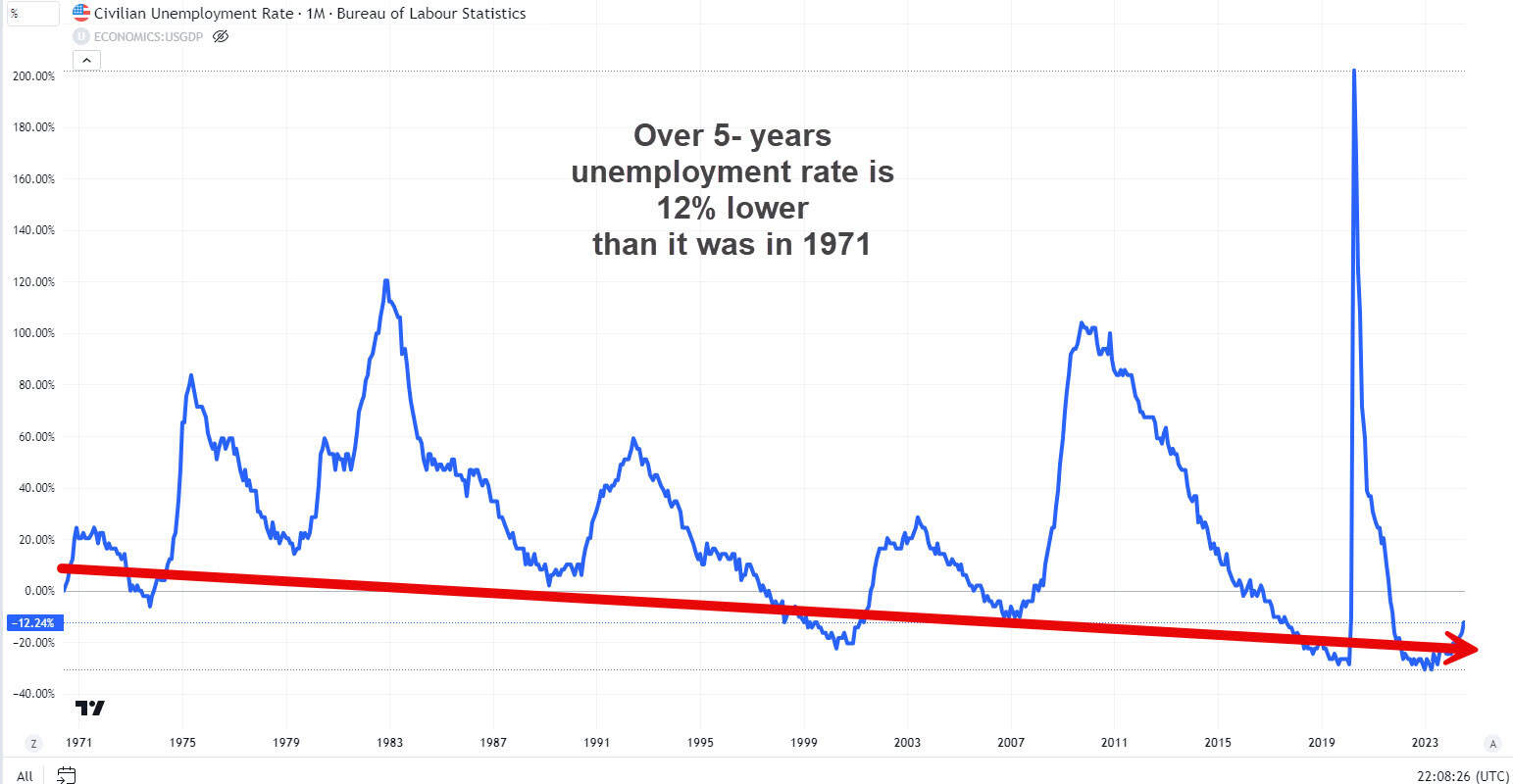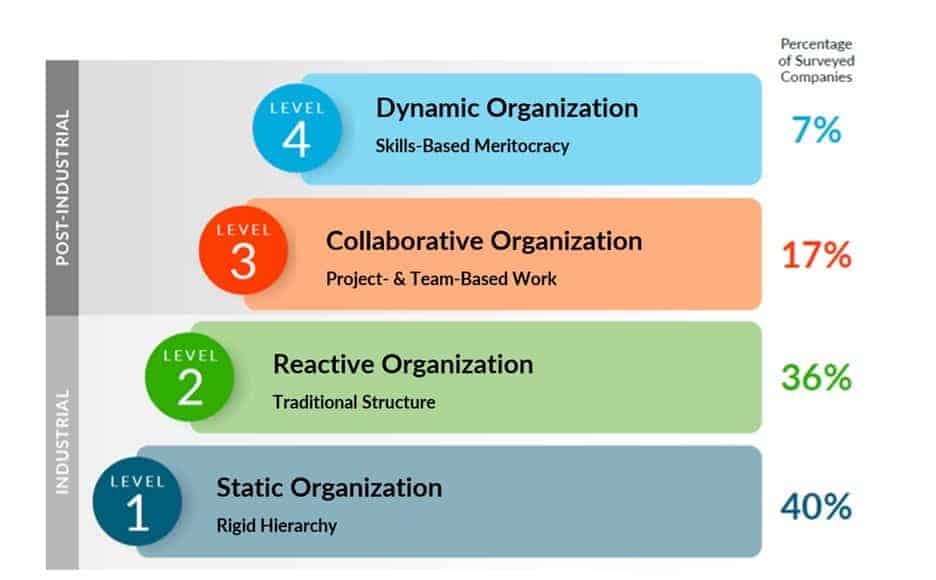As The Economy Slows, Focus On The Skills Of The Future: Ability To Change.
This week we saw US unemployment “tick up” to 4.3% and economists started begging for lower interest rates. For those of us who talk with companies and leaders all day, I would say we’re experiencing what I’d call a normal economic cycle.
The last major recession (not including the Pandemic, which was not a demand slowdown) was in 2008 and 2009. This means we’ve gone for almost 16 years without a serious economic cycle, almost twice as long as usual. While the pandemic did slow companies down a lot, we recovered quickly. So looking at unemployment, it more or less looks like this.
After 50 years of unemployment changes, the rate is 12% lower than it was five decades ago, leading me to conclude we’re living in a “long-term labor shortage.” The US GDP, by the way, has increased by 1500% during that period.
 |
So while we may have a slowdown in GDP growth right now (I think it’s driven by consumer prices that have just exhausted us from spending), we’re actually just seeing a very long term transformation from “industrial, high-labor businesses” to what we call “post-industrial” companies that tend to need fewer “workers” and more highly-trained employees. (Read our Post-Industrial Age research.)
There are still plenty of hourly jobs: nursing, healthcare, transportation, construction, retail, entertainment, energy, and many other industries depend on various types of “labor” workers. These jobs are becoming more automated over time, leading to higher wages and more advanced skills, but still a good 63% of US workers do not have a college degree, and most of them are finding work.
And while everyone seems a bit freaked out about the layoffs at Intel, UKG, Intuit, or other “AI-related” job changes, the US economy is responding well. I know many companies who are experimenting with AI and other technologies and every one of them is worried about losing valuable people because the labor market remains competitive.
Yes, some companies go through layoffs. Often this is caused by poor leadership, bad planning, or just a knee-jerk reaction to investors. Ultimately, as the birth rate remains stubbornly low, we are STILL going to have worker shortages, and the value of people as “an appreciating asset” will continue. (And as I’ve pointed out in the past, layoffs are not inevitable.)
 Over the last three weeks I met with more than 20 large companies in Europe and every single one is investing in employee development, reskilling, internal mobility, and programs to improve productivity. In Europe, where laying people off is both harder and more expensive, companies feel the labor shortage so they are still investing in staff.
Over the last three weeks I met with more than 20 large companies in Europe and every single one is investing in employee development, reskilling, internal mobility, and programs to improve productivity. In Europe, where laying people off is both harder and more expensive, companies feel the labor shortage so they are still investing in staff.
As far as consumer demand starting to decline, we’re facing the “long ending” to an extended period of high prices. Consumers are fed-up with high prices for the last five years, and before that we had almost a decade of zero interest rates where the price of houses and most capital goods kept rising. Now that both of these factors are ending, and the wierd “zero-interest” economy is over, we’re simply going back to a more normal economy.
In other words, if you jack up prices “just because you can,” you’ll pay the price later when consumers revolt. If you stop investing in your people, they simply “quietly quit” or go elsewhere. These are what I think of as “normal business economics,” and I think we’re seeing a lot of that normalcy taking place.
Operating as A Dynamic Organization
The big “trend” of course is the digital and AI revolution in each industry. Auto makers got “head-faked” into EVs, only to find that hybrid motors, digital cameras and electronics, and new ways of buying cars were very disruptive. Publishers are figuring out what to do about AI platforms and this time they’re holding onto their IP and negotiating for licenses. Energy companies are slowly moving to new sources, and everyone else is just figuring how to digitize, AI-enable, and further simplify what we produce and sell.
This is all the “exciting work” of business, and it’s all about being a Dynamic Organization. As our research points out, operating in a Dynamic way is all about people.
 |
The economy, which tends to go in cycles (often caused by over-exuberance and then exhaustion), is just something to deal with. And for me, as someone who has lived through many of these peaks and valleys, I always feel a bit “relieved” when things stop going up and we see a little cooling off period.
Yes, the stock market could plunge. It always does at some point. But that’s really a “crowd-sourcing” effect that often has nothing to do with our companies. If you’re taking care of your customers, investing in the future, and quickly learning about AI and all the new technologies at hand, you’re going to transition well. And as many HR leaders talked with me about this month, much of your success is going to come down to people.
The Skills Of The Future Are Clear: Ability To Drive Change
I had an interesting set of meetings today with a group of HR leaders we talk with every few weeks. Every single one of the CHROs and other leaders told us they are investing in “change management” and “business transformation” skills in their people. What does that mean?
It means just this. While we all want more engineers, manufacturing gurus, scientists, and sales and marketing experts in our companies, the biggest set of “skills” we need is the “ability to drive change.” That particular skill is quite complex, learned over time, and massively important at the moment. And that led me to my final point.
If you’re Tufan Erginbilgiç, the CEO of Rolls Royce, and you’re in the middle of a business transformation to drive engineering efficiency and excellence, you don’t just worry about engineers. You worry about people who can drive, lead, inspire, and create change. These, I believe, are the “skills of the future” everybody keeps talking about. If you as a professional, a manager, or a leader really know how to “drive and execute change,” these economic cycles are just “blips” in your career.
After 30+ years talking with HR leaders and running our own business through many cycles, I urge you to “not get too worried” about these big economic numbers. We’re living in a period where the economic value of each individual in your company is skyrocketing. Invest in your people and yourself, and you’ll do fine as the economy changes.
And if you want to learn about “change” as a leadership skill, join our Academy and check out our highly-regarded programs in organization design, change agility, employee experience, design thinking, and leadership. Right now every penny you spend on professional development will pay for itself many times over in the future.
Additional Information
Welcome to the Post-Industrial Age
Irresistible: The Seven Secrets of the World’s Most Enduring, Employee-Focused Organizations
